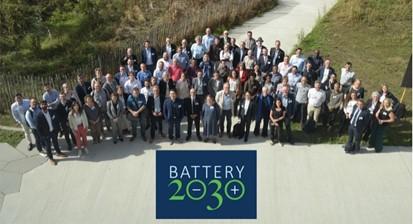
Title: BATTERY 2030+ CSA3 large-scale research initiative: At the heart of a connected green society
Call ID: HORIZON-CL5-2022-D2-01-08
EU nr: 101104022
Total Budget: € 3,102,223.75
VUB Allocated Budget: € 42,500
Contact: Prof. Dr. ir. Maitane Berecibar
At ERIS we have asked Maitane 2 questions:
What is B2030 CSA3 about?
Can you tell us a little bit more about the context of the BATTERY 2030+ large research initiative in a nutshell?
Maitane: “The European battery eco-system is rapidly evolving, answering to a growing demand for new battery technologies and contributing to Europe’s goal of becoming a carbon-neutral continent by 2050 (Green Deal). Today, new giga-factories for battery cell production are announced-being built or are even operational- to ensure a more autonomous Europe regarding battery cells and systems. It is expected that Europe will create 800,000 jobs in the battery value chain and manufacture 16 million electric vehicles per year. So, having access to world-class research is key for industry to invest and develop in long-term competitive and sustainable technologies. Required investments and resources should be driven on one hand by a political vision, as pronounced by the European Commission identifying the batteries as strategic for EU, and on the other hand by a long-term scientific vision of the battery’s technology development. In other words, the strong growth of the battery industry in Europe needs to be matched by joint efforts of the best scientists in academia, RTOs and industry.”
Why is B2030 CSA3 important for VUB?
Maitane: “Engaging the next generation scientists within BATTERY 2030+ and all B2030+ projects encompasses to ask them to provide input on the roadmap and its themes as well as on educational curricula.
The goal is to produce a battery manifesto and to set up next-generation scientist events in six different locations across Europe of which here in Brussels. All locations will be virtually connected to allow discussions between locations. Scientists will be selected in order to have wide range of heterogeneous competences, both within and outside the battery field, including representatives from companies. Following this activity the network “EBaNext” (European BATTERY 2030 Community of Next Generation Battery Scientists in Europe) will be created.
VUB is a key partner, and among many events and meetings, the Annual Meeting of 2022 was held at VUB, see the consortium group picture below. “
AIM
Collaborative, long-term research on future battery technologies has since 2019 been supported by the European Commission with the BATTERY 2030+ initiative. This project, BATTERY 2030+ CSA3, builds on earlier CSA (Coordination and Support Action) efforts to coordinate and monitor research projects earmarked BATTERY 2030+ to work together towards the goals in the BATTERY 2030+ roadmap. Other HE R&I projects are invited as associated.
The overall aim of the BATTERY 2030+ initiative, is to invent the batteries of the future by providing breakthrough technologies to the European battery industry across the full value chain; to strengthen long-term European leadership in both existing markets (road transport, stationary energy storage), and future emerging applications (aerospace, medical devices, internet of things). In this third phase Accelerated Materials Discovery, Battery Interfaces, Smart Functionalities, Manufacturing and Recycling are covered.
METHODOLOGY
BATTERY 2030+ CSA3 builds on, and extends beyond, the earlier achievements of the BATTERY 2030+ initiative with several objectives:
-Implementation and monitoring of the research activities contributing to the BATTERY 2030+ initiative;
-Update and develop the BATTERY 2030+ roadmap, by mapping ongoing R&I activities and identifying emerging obstacles and research needs;
-Accelerate the research by identifying and making available best practices and guidelines for ontology development, data sharing, and standardizations.
Consequently, BATTERY 2030 will act as a platform to interact with the projects and their participants to drive long-term research and generate concrete new research results and innovations for European industry.
IMPACT
BATTERY 2030+ CSA3 will contribute to European curricula in future battery technologies. It will do so by promoting and communicating the objectives and the achievements of the BATTERY 2030+ initiative and strengthen collaboration with other EU R&I battery initiatives. With its structured long-term battery research roadmap it will act as a central competence hub enabling effective interactions between research, industry and EU or member states authorities

